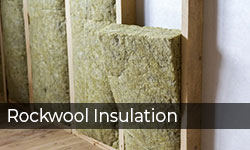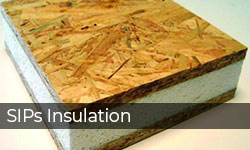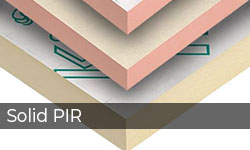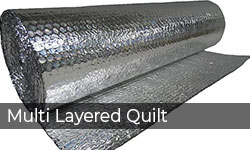
PIR Insulation Board
PIR Insulation Board
Highly practical, durable and easy to fit, PIR insulation boards offer fantastic performance. Their unique construction makes them incredibly versatile, and they can be cut to size on-site with just a handsaw. While their size often means that insulating a larger area is impractical, the outstanding u-values and cost-effectiveness of insulation boards still makes them an enticing option.
Insulation boards come in a huge variety of thicknesses and sizes, perfect for those looking to insulate a number of different spaces in a single project. What’s more, PIR insulation is also highly resistant to fire, water, and compression – three things that can plague other forms of insulation. We’re proud to work with Celotex, the most well-regarded PIR insulation brand in the industry.
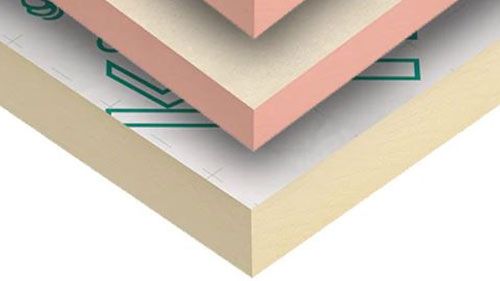
Advantages of PIR Insulation Board
Disadvantages of PIR Insulation Board
High R-Value
Rigid foam board insulation has good R-values. The R-value for any type of insulation is the measure of its efficiency.
The higher the R-value, the more effective the insulation. Depending on the type of foam board used, the R-values can range from 3.6 to 8.0 per inch of thickness.
For reference, the average R-value for fiberglass insulation, one of the most common types of insulation, is 2.2 to 4.3 per inch of thickness.
The high R-value means homeowners can use rigid foam board insulation in nearly any climate.
Cost
The cost of rigid foam board insulation does tend to be higher than other popular forms. As a result, the upfront costs of foam board insulation may be higher, but in this case, the benefits tend to outweigh this drawback.
If you have the budget to pay for the insulation upfront, there is a good return on investment. Typically, the lower utility bills and moisture damage prevention will more than make up for the initial cost of the materials and installation.
Prevents Thermal Bridging
Thermal bridging can happen where heat loss occurs in a home from heat moving through other, more conductive materials instead of the insulation.
Thermal bridging occurs most often when there is a break in interior insulation when it intersects other building materials like studs. Because contractors install rigid foam board insulation on the structure’s exterior, it inherently prevents thermal bridging from occurring.
Proper Installation Required
Without proper installation, the benefits of rigid foam board insulation are minimal. Luckily, no special equipment is needed to install it, but it must be done correctly.
In addition, there are code restrictions on the installation and sealing of rigid foam board insulation. Without it, moisture and air can penetrate the insulation.
Controls Moisture
While not all three types of rigid foam board insulation can act as a vapor barrier, they all help control moisture. Not only do they protect the interior wood or framing from having contact with exterior rain or humidity, but they also keep the interior sheathing warm enough that moisture does not accumulate.
EPS can act as a vapor barrier. XPS is not a complete vapor barrier, but professionals consider it vapor retardant. Moisture will only impact XPS insulation in the very long term. Polyiso insulation can be made into a vapor barrier by applying different types of sheathing.
Not Very Structurally
Rigid foam board insulation provides some structural strength. Howbeit, it is not as strong as plywood or OSB sheathing.
Luckily, contractors can use rigid foam board and wood sheathing on top of each other to provide both insulation and structural stability. If you do not plan to have wood sheathing with the insulation, you will need to find another form of bracing to help improve the structural integrity of the insulation.
Prevents Air Leaks
Rigid foam insulation provides a continuous seal on the exterior of your home, helping prevent unwanted air leaks, which could cause inefficiencies.
In addition, this type of insulation can stop air from getting in and out of your home. Most seals only prevent one or the other, but rigid foam insulation does both.
Sensitive To UV Light
Rigid foam board insulation is sensitive to UV light, such as sunlight. Howbeit, this doesn’t present an issue after installation.
Therefore, it is critical to store it correctly before installation to prevent damage. Contractors will handle this for you, but it’s something to consider as a homeowner.






